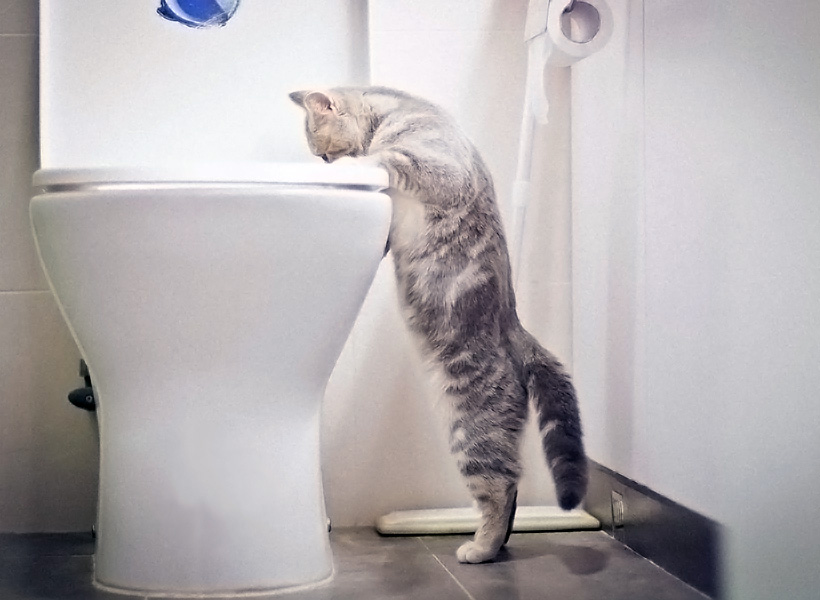Reasons You Should Avoid Flush Cat Poop Down Your Toilet - Crucial Facts
Reasons You Should Avoid Flush Cat Poop Down Your Toilet - Crucial Facts
Blog Article
The content down below involving Can You Flush Cat Poo or Litter Down the Toilet? is immensely entertaining. Give it a go and make your own personal final thoughts.

Introduction
As feline owners, it's essential to bear in mind just how we deal with our feline buddies' waste. While it might seem hassle-free to flush pet cat poop down the bathroom, this practice can have harmful effects for both the atmosphere and human wellness.
Environmental Impact
Purging feline poop presents unsafe microorganisms and parasites right into the supply of water, positioning a significant threat to marine ecosystems. These pollutants can adversely impact marine life and compromise water high quality.
Wellness Risks
In addition to environmental concerns, purging pet cat waste can also position wellness dangers to humans. Cat feces might have Toxoplasma gondii, a parasite that can trigger toxoplasmosis-- a possibly severe health problem, particularly for expectant ladies and individuals with damaged immune systems.
Alternatives to Flushing
Fortunately, there are much safer and much more accountable means to dispose of pet cat poop. Consider the complying with alternatives:
1. Scoop and Dispose in Trash
The most typical approach of disposing of pet cat poop is to scoop it right into a naturally degradable bag and toss it in the garbage. Make sure to make use of a devoted litter scoop and take care of the waste quickly.
2. Use Biodegradable Litter
Go with biodegradable cat trash made from materials such as corn or wheat. These litters are eco-friendly and can be securely disposed of in the garbage.
3. Bury in the Yard
If you have a backyard, consider hiding cat waste in an assigned area far from vegetable yards and water sources. Make sure to dig deep enough to stop contamination of groundwater.
4. Install a Pet Waste Disposal System
Invest in a pet dog garbage disposal system specifically made for feline waste. These systems utilize enzymes to break down the waste, decreasing smell and ecological effect.
Conclusion
Accountable pet ownership expands past offering food and shelter-- it also includes correct waste monitoring. By refraining from flushing cat poop down the toilet and selecting alternative disposal techniques, we can reduce our environmental impact and safeguard human wellness.
Why You Should Never Flush Cat Poop Down the Toilet
A rose by any other name might smell as sweet, but not all poop is created equal. Toilets, and our sewage systems, are designed for human excrement, not animal waste. It might seem like it couldn’t hurt to toss cat feces into the loo, but it’s not a good idea to flush cat poop in the toilet.
First and foremost, assuming your cat uses a litter box, any waste is going to have litter on it. And even the smallest amount of litter can wreak havoc on plumbing.
Over time, small amounts build up, filling up your septic system. Most litter sold today is clumping; it is made from a type of clay that hardens when it gets wet. Ever tried to scrape old clumps from the bottom of a litter box? You know just how cement-hard it can get!
Now imagine just a small clump of that stuck in your pipes. A simple de-clogger like Drano isn’t going to cut it. And that means it’s going to cost you big time to fix it.
Parasitic Contamination
Believe it or not, your healthy kitty may be harboring a nasty parasite. Only cats excrete Toxoplasma in their feces. Yet it rarely causes serious health issues in the cats that are infected. Most people will be fine too if infected. Only pregnant women and people with compromised immune systems are at risk. (If you’ve ever heard how women who are expecting are excused from litter cleaning duty, Toxoplasma is why.)
But other animals may have a problem if infected with the parasite. And human water treatment systems aren’t designed to handle it. As a result, the systems don’t remove the parasite before discharging wastewater into local waterways. Fish, shellfish, and other marine life — otters in particular — are susceptible to toxoplasma. If exposed, most will end up with brain damage and many will die.
Depending on the species of fish, they may end up on someone’s fish hook and, ultimately on someone’s dinner plate. If that someone has a chronic illness, they’re at risk.
Skip the Toilet Training
We know there are folks out there who like to toilet train their cats. And we give them props, it takes a lot of work. But thanks to the toxoplasma, it’s not a good idea.
:max_bytes(150000):strip_icc()/0S1A1090-49a8e2c66f8e41d6901f2559787a7f24.jpg)
Do you enjoy reading up on How to Dispose of Cat Poop and Litter Without Plastic Bags? Put feedback down the page. We would be interested to see your suggestions about this post. We are looking forward that you visit us again later on. Do you know about anybody else who is in the market for the topic? Why not share it. Many thanks for your time. Please check up our website back soon.
Click Here Report this page